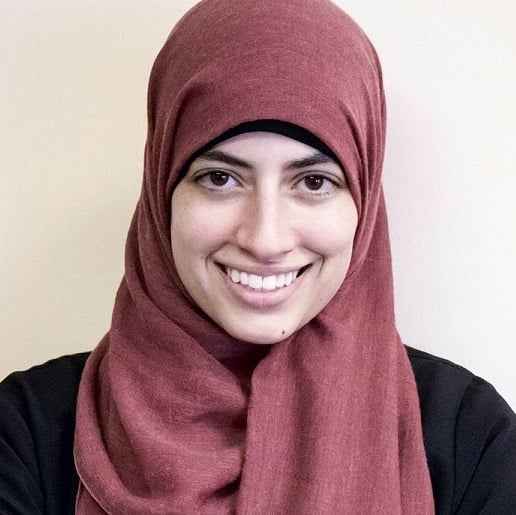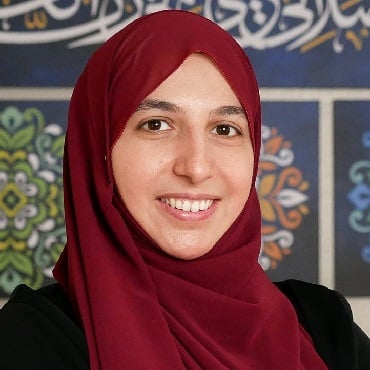After the end of a meaningful relationship, opening yourself up to trust again can feel incredibly overwhelming. When overgeneralization takes over, you are naturally going to assume that since one person has hurt you, every person in your life is capable of being inconsiderate, untrustworthy, and unfaithful. As mentioned earlier, this mindset can extend to an inability to trust Allah. However, in reality, in your journey toward healing, there is no better place to gain a sense of security than in your relationship with Allah.
It is important to keep in mind that Allah (swt) is above and beyond what our minds are capable of imagining. We imagine that we can no longer make du’aa because the prayers we have fervently been making have not yet come to fruition or because we blame Allah for allowing someone to betray us. However, realistically, we trust in Allah every single moment of every single day. We trust in Allah with every breath we take—we trust that He will allow that inhalation to reach our lungs. We trust Allah with every bite we eat—we trust that He will allow the nourishment to access the parts of our body that need it most. Every blessing we encounter is by the will of Allah and they are innumerable. So, when we say that we can never trust again—that we can’t even trust Allah—realize that the way we live every second of our lives contradicts this thought.
The guarantees of human beings are not always guarantees. However, the promise of Allah is always a guarantee.
Allah (swt) says,
“[It is] the promise of Allah. Allah does not fail in His promise, but most of the people do not know.”[11] We assume that when our prayers are not responded to exactly in the way we envision them that Allah has chosen to overlook us. However, realize that we often ask for what we want, not what we need. We assume that our wants are best for us but Allah knows us better than we know ourselves. He says,
“But perhaps you hate a thing and it is good for you; and perhaps you love a thing and it is bad for you. And Allah knows, while you know not.”[12] There is a difference between wanting something and needing something. If what we are asking for is not given to us, then we don’t truly need it.
Also realize that every prayer is heard but the answer to each prayer may come in a different form than what we anticipate. We assume that our du’aa can only be answered in one particular way—the way we envision the response. However, the Prophet Muhammad ﷺ said, “There is no Muslim who supplicates to Allah without sin or cutting family ties in it but that Allah will give him one of three answers:
- He will hasten fulfillment of his supplication
- He will store it for him in the Hereafter
- He will divert an evil from him similar to it.”
They said, “In that case we will ask for more.” The Prophet said, “Allah has even more.”[13] Try to take an objective look at your life. The prayers you have been asking for that you feel have not yet been responded to—could the answers possibly have come in a different form? Could the hurt you’ve experienced actually be a form of protection from something else that may have come your way?
You may have prayed for a marriage filled with love and mercy and just found out that your husband has been with someone else. The pain you are enduring feels unbearable but, as you process it, consider the fact that the children you have were meant to be yours through your marriage with him. Despite his betrayal, there are certain aspects of your marriage that can never be taken away—your children, your experiences, and the lessons you learned during your time in this relationship. After processing your hurt, when you’re ready to shift your focus away from the pain of the betrayal, consider the fact that you are no longer in an unhealthy relationship and realize that your du’aa may have been responded to by Allah granting you the love of your children and also diverting a different evil away from your life through your marriage to your husband.
Instead of thinking, “I’ve been hurt so deeply. I can never trust anyone again,” reframe this thought to encompass an understanding that there is One Being who will never betray you: “I’ve been hurt so deeply. I know I’m afraid to trust because that makes me vulnerable to being disappointed. However, Allah will never disappoint me. I trust that even when things happen that seem negative on the surface, there is something good in it because Allah always takes care of my needs.”
Getting to know Allah as a means of regaining trust
While overgeneralization and the weight of betrayal trauma can impact our relationship with Allah (swt), one of the best ways to reconnect with Him is through getting to know Him, His Names, and His Attributes. We cannot realistically trust someone we don’t know so, naturally, learning more about who Allah truly is will be an important step in reconnecting with Him (swt).
Consider a story that illustrates some of the beautiful Names and Attributes of Allah (swt) that remind us of the fact that even though we may struggle to emotionally open ourselves up to trusting Him, He is still our Protector every step of the way.
The Prophet Yusuf
عليه السلام was described as,
“The honorable is the son of the honorable, the son of the honorable, i.e., Joseph, the son of Jacob, the son of Isaac, the son of Abraham.”[14] The story of Yusuf عليه السلام is one filled with danger and betrayal yet is also inspirational as the culmination of it shows us the one stable force in his life (and in our own lives): the presence and care of Allah (swt). One thing to remember is this: even one so beloved to Allah experienced tremendous betrayal so it is not an indication of Allah’s love and care that those around us choose to hurt us.
Yusuf عليه السلام experienced the betrayal of his own brothers who intended to kill him, of an employer who attempted to seduce him toward sin and then wrongfully accused him of sexual violation, and of high ranking officials who jailed him despite his having not committed a crime.
Throughout all of this, Allah (swt) was, “closer to him than [his] jugular vein”[15] and protected him by giving him ways to dodge physical and spiritual danger. While plotting to kill him, one of Yusuf’s brothers suggested placing him in a well instead. When he was accused of rape, physical evidence to the contrary was presented. When constant temptation to engage with women sexually was offered to him, Allah (swt) positioned Yusuf in prison to save him from spiritual danger. Through experiencing constant betrayals, Prophet Yusuf
عليه السلام realized that he only had Allah. We learn from his example: Even when those closest to you betray you, Allah (swt) can raise your status and open doors for you in the most difficult and darkest of times. From the outside looking in, it appears as though Yusuf was moving backward and his life was falling apart but he was actually being positioned to become who Allah has destined him to be. If even one small step had been missing in his journey, it would not have culminated in the finale in which Yusuf was given a high ranking position in the government and was reunited with his family in a position of nobility and honor. This is the hidden hand of God. At the end of his story, Yusuf عليه السلام reflects on his deep understanding of the Lord who brought him through such arduous challenges, protected him, and shaped him into the person he had become.
And he raised his parents upon the throne, and they bowed to him in prostration. And he said, “O my father, this is the explanation of my vision of before. My Lord has made it reality. And He was certainly good to me when He took me out of prison and brought you [here] from bedouin life after Satan had induced [estrangement] between me and my brothers. Indeed, my Lord is Subtle in what He wills (al-Lateef). Indeed, it is He who is the Knowing, the Wise.
My Lord, You have given me [something] of sovereignty and taught me of the interpretation of dreams. Creator of the heavens and earth, You are my protector (Wali) in this world and in the Hereafter. Cause me to die a Muslim and join me with the righteous.”[16]
Here we see that Yusuf عليه السلام calls Allah (swt) by two of His Names, al-Lateef, the Subtle and Gracious, and al-Wali, the Protector:
Al-Lateef: The One who is Kind, Gracious, and Understanding, with regard for the subtle details of individual circumstances.[17] He knows what is in your heart and mind. He knows exactly what you’re going through. He knows where hidden goodness lies and His approach to addressing this can be so subtle that it’s imperceptible to us and beyond our comprehension. You can see this Name in action during moments when you’re feeling down and a friend randomly sends you a meme that makes you laugh. Or when you open the Qur’an and suddenly come across an ayah that resonates with you in a way it never had before. Or when you’re stuck in traffic and the bumper sticker of the car in front of you has a message that strikes you as inspirational. It’s not simply your friend who is comforting you, it is Allah who sent that friend, that statement on that bumper sticker, or that verse to uplift you. That is al-Lateef.
Al-Wali: The One who is the loving Defender, the nearby Guardian, and a constant Supporter.
[18] He is the One who lovingly supports us in paving the way toward that which we most need in every moment of our existence. He is the One who defends us from potential harms of which we are completely unaware. He is the One who guides us and turns us toward that which is most needed, despite it sometimes not being what we want for ourselves. You can see this Name in action when you are running late to work and caught in traffic when suddenly you see a horrible car accident in the lane you normally drive in every day, realizing that could have been you. Or when you find out a new friend you’ve quickly grown to love has been saying horrible things about you to others, causing you to witness her true colors and end the friendship before you’ve shared too much of yourself with her. Allah’s protection often comes in forms we may not notice but we can be confident that al-Wali is constantly defending us.
Opening ourselves up to trusting again, even trusting Allah (swt), can be a terrifying step. However, in choosing to take action rather than avoiding anything that reminds us of the betrayal we have faced, we reclaim the power we have given to those who have hurt us and choose to thrive despite them. This power you reclaim, this ability to trust again and expand your world to include new experiences, is a gift from Allah (swt) and another demonstration of His Mercy, His Protection, and the amazing plan He has for your life.


